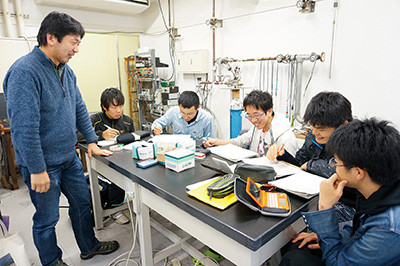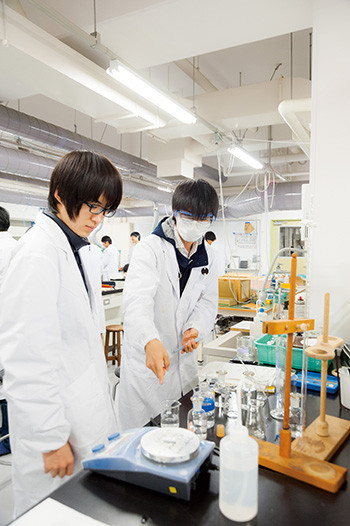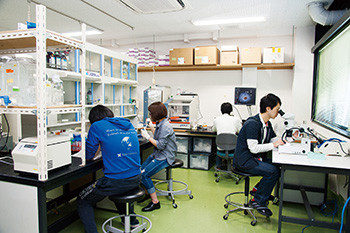Faculty of SCIENCE
Question Nature and Learn from It
Develop creativity with clear goals
 The Faculty of Science, Kyoto University, has two educational objectives for nurturing students to take the responsibility for the future progression of the natural sciences in the next generation:
The Faculty of Science, Kyoto University, has two educational objectives for nurturing students to take the responsibility for the future progression of the natural sciences in the next generation:
- Provide opportunities to learn the fundamental knowledge of the natural sciences and develop students' ability to creatively apply that knowledge.
- Develop students' ability to integrate knowledge into new intellectual values.
To achieve these educational objectives, we provide a liberal academic culture and encourage creative scientific activities and autonomous learning. We have established a one-faculty system, which allows students to first engage in a process of "gradual specialization" and then move forward to the forefront of the sciences.
Years 1 and 2:
Focus on the Liberal Arts and Sciences Courses and the basics in specialized fields
All the students in the Faculty of Science of Kyoto University learn common subjects (subjects learned by the entire faculty) in Years 1 and 2, comprising mainly Liberal Arts and Sciences Courses and the basics in specialized fields. Liberal Arts and Sciences Courses include eight groups: Humanities and Social Sciences, Natural Sciences, Languages, Informatics, Health and Sports, Career Development, Interdisciplinary Sciences, and Seminars in Liberal Arts and Sciences (academic staff from the Faculty of Science provide lectures in many natural science subjects). The basic subjects for the specialized fields lay the foundation for more specialized major studies in Year 3 and later. The first two years provide students with opportunities to develop basic knowledge and skills to excel in specialized sciences, to explore various academic disciplines, and to broaden their horizons.
Years 2 and 3:
Five majors of targeted expertise in the natural sciences
Students select one of the five majors at the end of Year 2 and begin studying in their specialized fields in Year 3. (Kyoto iUP students select their majors at the time of application and they are determined before Year 1.) In the majors, students take specialized subjects, including seminars, experiments, and practicums, to acquire the most advanced knowledge accumulated by the Faculty of Science, Kyoto University.
- Mathematical Sciences Major: Mathematics subjects
- Physics and Astrophysics Major: Physics and Astrophysics subjects
- Earth and Planetary Sciences Major: Geophysics and Geology Mineralogy subjects
- Chemistry Major: Chemistry subjects
- Biological Sciences Major: Zoology, Botany, and Biophysics subjects
 Year 4:
Year 4:
Graduation work
All the students are required to submit a final piece of research in Year 4. The students are provided with personalized instruction from their supervisors to learn research methods and develop their ability to summarize results. Through these activities, their motivation to engage in more advanced specialized research is expected to increase.
Application for Graduate School at Year 3
The Division of Mathematics and Mathematical Sciences and the Division of Chemistry, Graduate School of Science provide undergraduate students who have studied in the Faculty for at least three years with admission to apply to the master's degree program if the candidates have been in excellent academic standing for the specified subjects. Graduates who are enrolled in the doctoral program may be granted a doctoral degree within the combined five-year master's and doctoral program period if they demonstrate remarkable achievements.
Study programs for the five majors
Mathematical Sciences Major:
Students learn the basics of higher mathematics and explore cutting-edge mathematical theories
 Mathematics is a discipline that aims to understand the laws governing changes in numbers, figures, and quantities, and has a long disciplinary history. Nowadays many new mathematical problems have arisen, including those in other disciplines, such as physics, earth planetary science, chemistry, and biological science, requiring new theories to solve them. Additionally, because of its universal nature, mathematics maintains close ties not only with the natural sciences, but also with many social science fields, such as informatics and economics. Within the context of mathematics, the Major provides a broad education on the basics of algebra, geometry, mathematical analysis established in the first half of the 20th century, as well as encourages students to explore the latest mathematical theories.
Mathematics is a discipline that aims to understand the laws governing changes in numbers, figures, and quantities, and has a long disciplinary history. Nowadays many new mathematical problems have arisen, including those in other disciplines, such as physics, earth planetary science, chemistry, and biological science, requiring new theories to solve them. Additionally, because of its universal nature, mathematics maintains close ties not only with the natural sciences, but also with many social science fields, such as informatics and economics. Within the context of mathematics, the Major provides a broad education on the basics of algebra, geometry, mathematical analysis established in the first half of the 20th century, as well as encourages students to explore the latest mathematical theories.
●Learning areas / Number theory, algebra geometry, algebraic phase geometry, differential topology geometry, differential geometry, dynamical system, complex manifold theory, complex function theory, representation theory, function analysis, differential equation theory, stochastic theory, algebraic analysis/mathematical physics, theory of operator algebras, computer science, applied mathematics, and insurance mathematics
Physics and Astrophysics Major:
Provides a wide range of research and programs, including theoretical examinations, experiments, and observations
 Physics seeks to determine the universal laws of nature and to understand the various phenomena that result from differences in types of substances and scales of time, space, and energy. Based on the scientific nature of the discipline, the Physics and Astrophysics Major is divided into three departments. The Department of Physics I focuses on the structure and properties of substances. The Department of Physics II studies the basic structure of space-time, elementary particles, nucleus, gravity, and cosmology. The Department of Astronomy focuses on various scales of phenomena that can be observed, from the sun to the farthest known galaxies. Those departments are devoted to a wide range of research and educational activities, including theoretical exploration, experiments, and observations.
Physics seeks to determine the universal laws of nature and to understand the various phenomena that result from differences in types of substances and scales of time, space, and energy. Based on the scientific nature of the discipline, the Physics and Astrophysics Major is divided into three departments. The Department of Physics I focuses on the structure and properties of substances. The Department of Physics II studies the basic structure of space-time, elementary particles, nucleus, gravity, and cosmology. The Department of Astronomy focuses on various scales of phenomena that can be observed, from the sun to the farthest known galaxies. Those departments are devoted to a wide range of research and educational activities, including theoretical exploration, experiments, and observations.
●Learning areas / Irregular system physics, quantum optics/laser spectroscopy, low temperature physics, optical properties, solid quantum properties, quantum condensation properties, space-time/life physics, soft matter physics, nonlinear dynamics, condensed matter theory, phasetransition dynamics, fluid physics, non-equilibrium physics, nuclear and hadron physics, particle physics, cosmic-ray physics, particle theory, nuclear theory, nuclear astrophysics, solar physics, solar and astronomic plasma physics, stellar physics, galactic physics, and theoretical astrophysics
Earth and Planetary Sciences Major:
Committed to educational and research activities around apparent but profound and far-reaching events
 The Major deals with the Earth, the planet where we live, and the space between the planets surrounding the Earth. Courses encompass a wide scope of research, covering topics such as 1) the atmospheric flow's effect on cloud movement; 2) oceanic flows that occur deep below the Pacific Ocean beside Japan; 3) crustal movements inside the Earth, which cause earthquakes and form volcanos; 4) particles reaching the Earth from the sun that cause auroras and affect the Earth's magnetic field; 5) mantle flow, which built the Himalayas and split the continents of South America and Africa; 6) high-temperature and high-pressure environments, which created diamonds; 7) the evolution of organisms that originally existed as "rose algae" 3.5 billion years ago into their present forms and 8) the existence (past or present) of organisms on other planets. Although relatively familiar, these topics are related to profound and far-reaching events covered in the major.
The Major deals with the Earth, the planet where we live, and the space between the planets surrounding the Earth. Courses encompass a wide scope of research, covering topics such as 1) the atmospheric flow's effect on cloud movement; 2) oceanic flows that occur deep below the Pacific Ocean beside Japan; 3) crustal movements inside the Earth, which cause earthquakes and form volcanos; 4) particles reaching the Earth from the sun that cause auroras and affect the Earth's magnetic field; 5) mantle flow, which built the Himalayas and split the continents of South America and Africa; 6) high-temperature and high-pressure environments, which created diamonds; 7) the evolution of organisms that originally existed as "rose algae" 3.5 billion years ago into their present forms and 8) the existence (past or present) of organisms on other planets. Although relatively familiar, these topics are related to profound and far-reaching events covered in the major.
●Learning areas / Solid-earth geophysics, hydrosphere geophysics, atmospheric physics, solar-planetary electromagnetism, earth tectonics, petrology, mineralogy, stratigraphy, historical geology, and geochemistry, and cosmochemistry
Chemistry Major:
Seeks creation of useful new substances based on understandings of nature
 Chemistry works to discover structures, nature, and reactions at the atomic level and to create useful new substances based on scientific findings of nature. The Chemistry Major covers investigation of all the substances existing in nature, ranging from atoms to molecules and organisms to space, with vastly unexplored areas. Research methods and approaches vary greatly depending on the subjects and fields involved, ranging from the fields centered on experiments (synthesis, analysis, and measurements) to the theoretical and calculation-based fields. The wide variety of the fields and methods characterizes the varieties in chemistry, and students can select the major according to their interests and career objectives.
Chemistry works to discover structures, nature, and reactions at the atomic level and to create useful new substances based on scientific findings of nature. The Chemistry Major covers investigation of all the substances existing in nature, ranging from atoms to molecules and organisms to space, with vastly unexplored areas. Research methods and approaches vary greatly depending on the subjects and fields involved, ranging from the fields centered on experiments (synthesis, analysis, and measurements) to the theoretical and calculation-based fields. The wide variety of the fields and methods characterizes the varieties in chemistry, and students can select the major according to their interests and career objectives.
●Learning areas / Solid state physical chemistry, biostructural chemistry, quantum chemistry, theoretical chemistry, physical chemistry, molecular spectroscopy, photophysical chemistry, molecular structure chemistry, electron spin chemistry, surface chemistry, metallography, inorganic material chemistry, organic chemistry, organic synthetic chemistry, agglomerate organic molecule function, biochemistry, molecular material, and genetic dynamics
Biological Sciences Major:
Applies diverse methodologies to understand organisms and the environment holistically
 The Major focuses on the various ways organisms exist on the Earth and the underlying phenomena of life. Macroscopic approaches are used to address ecology, behavioral science, phylogenetic taxonomy, anthropology, natural history, and outdoor research and seek to clarify the mechanisms underlying biological diversity. Life sciences are now shifting to a new stage of exploring the new frontier of genome decoding. Microscopic approaches used in cell biology, embryology, molecular biology, and structural biology have also produced creative works and contributed to our understanding of various life phenomena at the molecular level. The major seeks to understand organisms, taking their environments into account and using methodologies from both microscopic and macroscopic viewpoints.
The Major focuses on the various ways organisms exist on the Earth and the underlying phenomena of life. Macroscopic approaches are used to address ecology, behavioral science, phylogenetic taxonomy, anthropology, natural history, and outdoor research and seek to clarify the mechanisms underlying biological diversity. Life sciences are now shifting to a new stage of exploring the new frontier of genome decoding. Microscopic approaches used in cell biology, embryology, molecular biology, and structural biology have also produced creative works and contributed to our understanding of various life phenomena at the molecular level. The major seeks to understand organisms, taking their environments into account and using methodologies from both microscopic and macroscopic viewpoints.
●Learning areas / Natural anthropology, human evolution, animal phylogeny, animal behavior, animal ecology, animal development, stress response biology, plant physiology, plant chronobiology, plant systematics, plant molecular cell biology, plant molecular genetics, genome information expression, theoretical biophysics, molecular physiology, neurobiology, structural physiology, and molecular embryology







